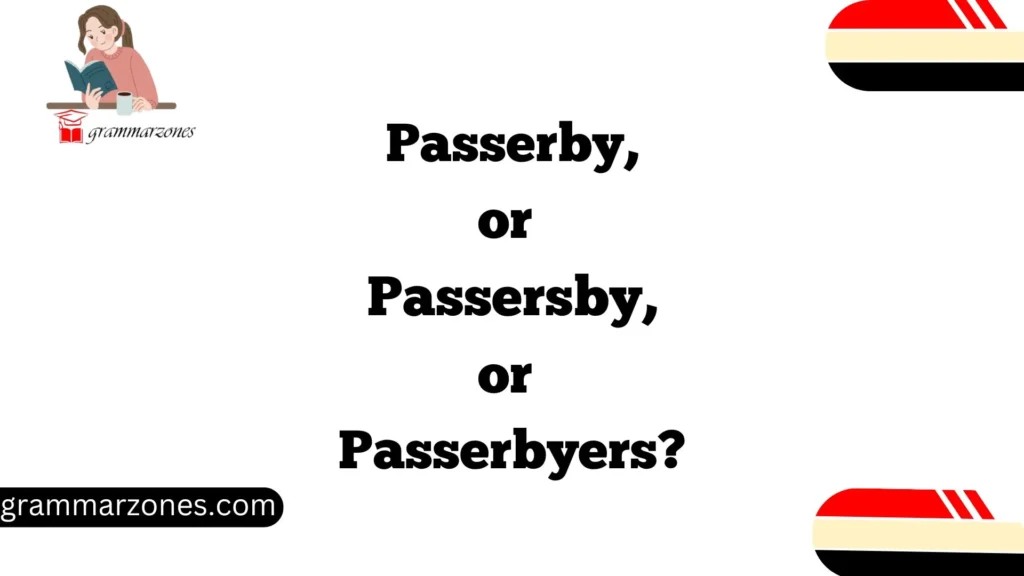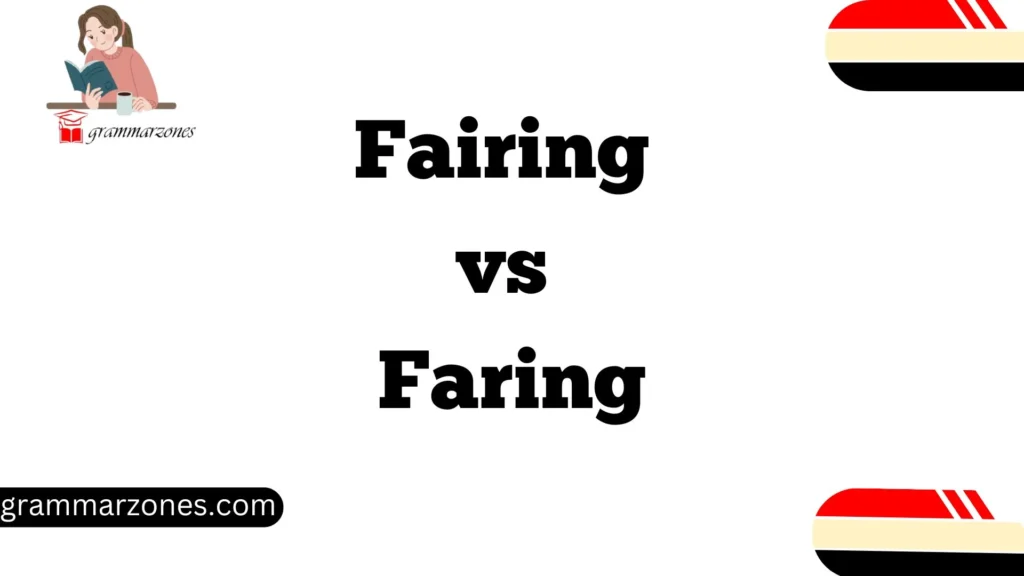Language is constantly evolving, and as it changes, new rules and exceptions emerge. One such example is the word “passerby” and its plural form. It’s a small but tricky part of English grammar that can confuse even native speakers.
Do you say “passerbyers,” or “passersby,” or “passerby” when referring to more than one person passing by? While these variations might seem similar, only one is correct.
In this post, we’ll dissect the usage of “passerby,” explore common mistakes, and explain the evolution of this term. By the end, you’ll be equipped to confidently use the right form in your writing and conversation.
Defining “Passerby” and Its Origins
Before we dive into plural forms, let’s first understand what the word “passerby” actually means.
A passerby refers to a person who happens to be passing by a specific location or situation. It’s typically used to describe someone who’s moving through an area, often without intending to stop. For example, if you’re walking down the street and someone briefly looks at your shop window, they would be considered a passerby.
The Origins of “Passerby”
The word “passerby” originates from two Old English components: “passer,” meaning someone who is passing, and “by,” meaning nearby or close. It’s a straightforward combination, which is why its use makes so much sense in the English language.
Historically, the term has been in use for centuries, but its form has remained relatively unchanged. It’s important to recognise that “passerby” is a compound noun, which plays a role in how we handle pluralisation.
What Is the Correct Plural Form of “Passerby”?
Now that we understand the meaning and origins of the word, let’s address the main question: what’s the correct plural form of “passerby”?
The correct plural is passersby.
When you pluralise “passerby,” you don’t add a standard “-s” at the end like you might with most nouns. Instead, you insert “res” after “pass” to form “passersby.” This is a peculiar feature of certain compound nouns in English.
Why Does This Happen?
To understand why we use “passersby,” it’s helpful to look at how compound nouns function in English. A compound noun is a word made up of two smaller words, and when pluralised, the pluralisation often happens to the first word rather than the second.
For example:
- Brothers-in-law (plural of “brother-in-law”)
- Mothers-in-law (plural of “mother-in-law”)
In the case of “passerby,” the plural form is “passersby” because we pluralise the first component of the compound—“passer”—and leave “by” unchanged.
Example Sentences:
- There were many passersby on the street during the parade.
- The passersby were curious about the new store opening.
Common Mistakes with Pluralising “Passerby”
English learners and even native speakers frequently make mistakes with the plural form of “passerby.” Let’s take a look at some of the most common errors.
- Passerbyers: One of the most common mistakes people make is to add “-res” to the entire compound noun, resulting in “passerbyers.” This form is incorrect and doesn’t follow standard English grammar rules for pluralising compound nouns.
- Passerby’s: Another mistake is using an apostrophe before the “s,” as in “passerby’s.” This form is incorrect because the apostrophe indicates possession, not plurality. For instance, “passerby’s” would imply ownership by a passerby, which is not the intended meaning in most contexts.
- Passerbys: Sometimes, people mistakenly pluralise the second part of the compound word, leading to “passerbys.” While this may seem like a logical way to form the plural, it doesn’t follow English rules for compound nouns.
The Confusion of “Passerbyers” and Why It’s Incorrect
“Passerbyers” is a variation that some people mistakenly use, likely due to the belief that pluralising “passerby” should follow the same rules as other nouns. However, “passerbyers” is not grammatically correct.
Why “Passerbyers” Doesn’t Work:
- English Compound Nouns: As mentioned earlier, English compound nouns often pluralise the first part of the word. “Passersby” follows this rule, so adding “-ers” to the whole word disrupts the natural structure.
- Historical Usage: “Passersby” has been the correct plural form for centuries. There is no evidence in historical texts of “passerbyers” being used.
If you’re tempted to use “passerbyers” in your writing, stop and remember that it’s a widespread mistake, and the correct form is “passersby.”
Hyphenation: Does “Passersby” Need a Hyphen?
Another common question about the word “passersby” is whether a hyphen is necessary.
The short answer is: No, “passersby” does not require a hyphen.
Why No Hyphen?
“Passersby” is a compound noun that has become widely accepted in English. While compound nouns sometimes include hyphens (e.g., “mother-in-law” or “check-in”), passersby does not need one. This is because it’s a standard, established compound noun with an agreed-upon structure. There’s no need to complicate it with unnecessary punctuation.
Other Examples of Non-Hyphenated Compound Nouns:
- Postman
- Fireman
- Bookshelf
The Standard Plural Form: Why “Passersby” Is the Correct Choice
It’s important to clarify why “passersby” is the proper choice in both formal and informal contexts.
- Grammatical Accuracy: As we’ve discussed, the plural form “passersby” follows the rules of English grammar for compound nouns. The structure of the word itself dictates this form.
- Common Usage: “Passersby” is the term most commonly used by writers, speakers, and grammarians alike. It’s the established plural, and it ensures your writing adheres to standard English conventions.
- Professionalism: In academic and professional writing, using the correct term reflects well on your command of the language. Mistakes like “passerbyers” or “passerby’s” may make you seem less credible.
Real-World Examples of “Passersby” in Use
Understanding how to use “passersby” properly is essential for mastering its usage in everyday communication. Here are a few examples in different contexts:
In Literature:
- “The passerby glanced over at the small, bustling cafe before continuing on his way.”
In Journalism:
- “Hundreds of passersby stopped to witness the public art installation in the city centre.”
In Casual Conversation:
- “There were a few passersby who paused to ask for directions.”
Incorrect Usage:
- “The passerbyers were looking confused.” (This is incorrect! Use “passersby” instead.)
The Evolution of Language: Why Language Changes Over Time
English is a living, breathing language, and its rules evolve over time. The way we use words like “passersby” can change as well, depending on how society chooses to adopt and adapt the language.
Factors Influencing Language Evolution:
- Cultural Shifts: New terms emerge as society changes, and some older terms fade out of use.
- Technological Advancements: As new technologies arise, language often evolves to keep pace.
- Globalisation: English has become the world’s lingual francs, and this global influence shapes how we use the language.
The Role of Usage and Acceptance:
When a large number of people consistently use a term in a certain way, that form can become accepted, even if it wasn’t technically correct in the past. This is how language evolves, and it’s why some terms shift over time.
Conclusion: Mastering “Passerby” and Its Plural Forms
Understanding how to use “passerby” and its plural “passersby” is a key part of mastering the English language. By following the grammatical rules, you can avoid common mistakes like “passerbyers” and “passerby’s,” and ensure that your writing is accurate and professional.
As with all language rules, the best way to remember them is through consistent practice and exposure. The next time you encounter the term, you’ll be confident in knowing that “passersby” is the correct plural form—simple, precise, and grammatically sound.
So, let’s recap:
- The correct form is “passersby” (not passerbyers or passerby’s).
- Hyphenation is unnecessary in this term.
- Be sure to use “passersby” in both casual and formal writing to sound natural and authoritative.
Mastering the correct use of “passersby” will not only improve your grammar but will also help you communicate more clearly and professionally. Keep practising, and soon it will feel as natural as the word itself!
FAQs
1. What is the correct plural form of “passerby”?
The correct plural form of “passerby” is “passersby.” It follows the rule of pluralising the first part of the compound noun (“passer”), while leaving the second part (“by”) unchanged.
2. Why is “passerbyers” incorrect?
“Passerbyers” is incorrect because the pluralisation of the compound noun doesn’t work by adding “-res” to the entire word. Instead, the first part of the compound (“passer”) is pluralised, resulting in “passersby.” Adding “-res” to the whole term disrupts the established pattern for pluralising compound nouns.
3. Is “passerby’s” a correct form?
No, “passerby’s” is incorrect in most contexts. The apostrophe indicates possession (as in “the passerby’s bag”), not pluralisation. If you are referring to more than one person, you should use “passersby” without the apostrophe.
4. Should I use a hyphen in “passersby”?
No, “passersby” does not require a hyphen. It is a standard compound noun that does not follow the hyphenation rule, which is typically used for words like “mother-in-law” or “check-in.”
5. Are there any exceptions to the pluralisation rule for compound nouns like “passerby”?
In general, most compound nouns follow the rule of pluralising the first part of the noun. However, English can be tricky, and some compound nouns may follow different pluralisation patterns. For example, “attorney general” becomes “attorneys general,” where “attorney” is pluralised, but “general” stays the same.

“Emma Rose is a dedicated language enthusiast who loves to explore the beauty of English grammar and writing. Through GrammarZones.com, Emma shares her expertise and passion for language, offering helpful resources and engaging lessons for learners at all stages.






